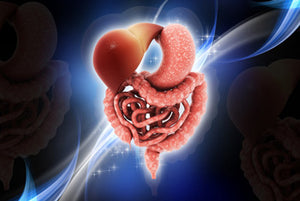The Second Brain
July 29, 2013

It’s an intriguing idea that what lays in your gut influences how you feel and even how you think. Believe it or not your gut is embryologically related to your brain – meaning that from the very beginning, as the body is forming, the gut and brain have similar origins. Once they’re fully developed, they relay information back and forth, keeping the brain informed of what’s going on in the gut and vice versa. So complex are the nerve complexes in the gut that it’s sometimes referred to as the “second brain.” Doctors call this network of gut nerves the enteric nervous system. Not only does the enteric nervous system regulate digestion, it may impact brain health and affect how you think and feel.
How can the gut alter receptors in the brain – at a completely different location? It seems to exert its effect on the brain through the vagus nerve. When researchers cut the vagus nerve in the rodents, there was no change in receptors in the brain. The vagus nerve appears to be the primary “highway” between the central nervous system and the intestines, a vital conduit that carries information between sites.
This “second brain” shares many features with our primary brain. It produces many of the same neurotransmitters that the brain makes, and more than half of all nerve cells are housed here. Neurotransmitters like serotonin and dopamine are chemicals that impact how we feel – our mood and appetite. Although it’s not clear whether neurotransmitters made by the gut can cross the blood-brain barrier to enter the brain, they can impact the brain through the vagus nerve. What does this mean? Maintaining a healthy, balanced gut could have far-reaching consequences, consequences that extend beyond the gut all the way to the brain.
One factor that plays a role in gut health is the bacterial population that makes its home there. Each person’s intestinal tract is colonized with a diversity of bacteria, as many as 100 trillion of them. Some of these bacteria called probiotics are beneficial because they keep disease-causing bacteria from gaining a foothold and causing infection. They also have a positive impact on the immune system. These bacteria are vital for maintaining gut health, and since what goes on in the gut affects the brain, they may affect our mood and how we feel.
Research is still ongoing to see exactly how probiotic bacteria impact mood and brain function. A small study in humans showed that taking a probiotic supplement containing certain strains of Lactobaccilus and Bifidobacterium eased psychological stress and reduced anxiety in humans. Another study showed that participants with chronic fatigue syndrome experienced less anxiety after taking a probiotic supplement three times daily for eight weeks.
It’s hard to deny the link between the brain and intestines. Ever felt a fluttering in your stomach when you’re anxious and scared? That’s just one example of how what goes on in your tummy impacts your brain. So if you want a calmer mind and a healthier digestive tract, make sure you’ve got the right bacteria on board.
Want to hear more about this subject? Natasha will be presenting at the Brain Solutions 2013 conference in Vancouver, Canada on August 24th/25th. Come along to learn more about this vital connection within your body.
The post The Second Brain appeared first on Natren Probiotics Blog.




Leave a comment